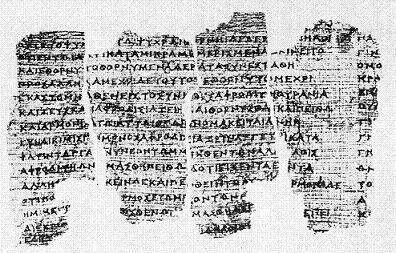Derveni papyrus
From Wikipedia, the free encyclopedia
The Derveni papyrus is an ancient Greek papyrus roll that was found in 1962. It is a philosophical treatise that is an allegorical commentary on an Orphic poem, a theogony concerning the birth of the gods, produced in the circle of the philosopher Anaxagoras
in the second half of the 5th century BC, making it "the most important
new piece of evidence about Greek philosophy and religion to come to
light since the Renaissance" (Janko 2005). It dates to around 340 BC,
during the reign of Philip II of Macedon, making it Europe's oldest surviving manuscript.[1][2] It was finally published in 2006.Style of writing
The text of the papyrus contains a mix of dialects. It is mainly a mixture of Attic and Ionic Greek; however it contains a few Doric forms, which need further explanation. Sometimes the same word appears in different dialectal forms e.g. cμικρό-, μικρό; ὄντα, ἐόντα; νιν for μιν etc.[5]http://en.wikipedia.org/wiki/Derveni_papyrus
THE PAPYRUS OF DERVENI
Thessaloniki, Archaeological Museum, from 4.4.98
A unique model of writing in antiquity, the "Papyrus of Derveni", is being exposed with other findings of the same excavation. The papyrus roll was found carbonized among the remains of the funeral pyre upon the slabs of Derveni Tomb A. It is probably the single one had been found in Greece and the script is dated to approximately the third quarter of the fourth century B.C. From scores and scraps, mostly tiny, it has been possible to reconstruct 26 columns of writing, of which only the upper part survives. After an account of funeral rites and eschatological beliefs, the main part of the text consists of a prose allegorical-philosophical interpretation of a theogonic poem written in dactylic hexameters and ascribed in antiquity to the mythical poet Orpheus. The unknown author seems to have composed the book at the close of the fifth century B.C. His language abounds with Ionic elements, but this does not speak necessarily for Ionic origins, since Ionic was the dialect typical for scientific prose. He seems well conversant with Ionic philosophy and the likeliest candidate seems to be the Athenian mantis Euthyphron.
http://books.google.gr/books?id=5HaKQFeYSBEC&pg=PA56&redir_esc=y#v=onepage&q&f=false
http://www.metafysiko.gr/forum/archive/index.php/t-1336.html


No comments:
Post a Comment